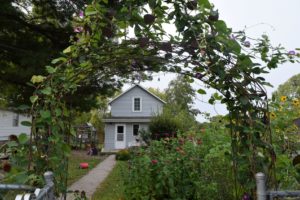 My reality of the life and rhythm I had created in my small Waldorf early childhood business was changing due to the pandemic journey that we were all experiencing last year. My attendance was dwindling until I eventually closed my doors for three months. Without my daily rhythm, the good and purposeful work, a source of income with stability, and the little ones who brought a sense of wonder and joy each morning, I was left questioning where to begin and even how to find the will and courage to dream again. Life was shifting for everyone, some adapted with cheerfulness at having more time available for their own quests and explorations, while others withdrew and observed this unusual worldwide event. There is a richness of stories of how people adapted, shifted, accepted, transformed, denied, or hid under this quilt of life at these times. Each in our own particular and unique ways, we made choices of how to live.
My reality of the life and rhythm I had created in my small Waldorf early childhood business was changing due to the pandemic journey that we were all experiencing last year. My attendance was dwindling until I eventually closed my doors for three months. Without my daily rhythm, the good and purposeful work, a source of income with stability, and the little ones who brought a sense of wonder and joy each morning, I was left questioning where to begin and even how to find the will and courage to dream again. Life was shifting for everyone, some adapted with cheerfulness at having more time available for their own quests and explorations, while others withdrew and observed this unusual worldwide event. There is a richness of stories of how people adapted, shifted, accepted, transformed, denied, or hid under this quilt of life at these times. Each in our own particular and unique ways, we made choices of how to live.
I wondered how I could continue to find meaning and connections. How could I find hope in a garden without children? Somewhere along the way, I realized that I had a choice. I could go into despair or go more deeply. It would be a struggle, but I decided not to give up on my business, but to persevere. It was with the help of an encounter with a friend that I accepted the journey that I was on and met the challenge. That friend was Miss Mouse, and she lives at Little House. This was how I found hope in a time of anguish.
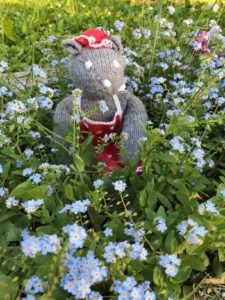
I began to write stories to my preschoolers about Miss Mouse at Little House, and her adventures. I wanted the children to sense that the world was still good, filled with beauty and aimed for truth. I wrote stories for the children about nature, the toad hiding in the garden, a discovery of a wasp’s nest and planting sunflowers towards the sky. There were stories about Miss Mouse’s fear of the dark and loneliness, and about the moon and stars including a traditional French lullaby to ease her journey into the night. There were tales about finding comfort, amid troubled times, by chopping vegetables and cooking Comfort Soup together. There were somber times of grief, while experiencing a deep sense of loss when one of my longtime families decided not to return to my program. I had their four boys in my preschool for twelve years. To find solace, I took long walks along the river, feeling the sadness and lack of closure, especially the inability to say “goodbye” in person with the children whom I dearly loved. Then I came upon a lovely rock garden covered with Forget-Me-Nots and in my heart, I felt the goodness of those boys and realized that their memories will always be with me. Certainly, I wanted the other children to know that I genuinely cared about them too, and so Miss Mouse and I sent each of them a packet of Forget-Me-Not seeds for them to plant in their own gardens.
As I shared these stories, I felt a sense of gratitude. I now had plenty of time to be creative and resourceful, and I found ways to make connections and find meaning in my life. In the early part of the summer, I was wondering about the parents’ intentions for returning to Little House and decided to meet with each family individually for an “Outside Play and Chat” hour. My goal was to re-develop the sense of trust that we had with each other. I listened to their stories about lockdown and its effects. I had requirements and guidelines about operating a childcare business that needed implementation, and equally important, I also wanted to listen to our hearts. I found myself building a bridge between our heads and our hearts, doing what was essential and safe, as well as following my own intuition of encouraging wonder and joy in the children’s lives.  Each day was like walking along the shore of a river on steppingstones, i.e., learning to take it slowly, finding balance, and observing before taking the next step. Through the summer, as I gained confidence by reconnecting and rebuilding my program, I felt a sense of hope and comfort in this exercise. Because of the physically distanced recommendation, I realized that I could not prevent children from touching each other. Naturally, one day I saw two children running towards each other, with smiles and laughter in their eyes and I knew that I could not deter their embrace. It was in that very moment, of witnessing their pure joy, that I wished to honor and protect it. For in my knowing-heart, joy is a healing quality, and I was determined not to deny that powerful and positive expression. We know today, after more than a year of isolation, that the human being of any age, is social and that our need to be with others is integral to a healthy life. I knew inwardly on that day, witnessing those two young children giving each other a tight hug, that I would adamantly support joy and touch as a healing balm for the soul, especially for young children. The next steps would be for me to share these reverent understandings with the families, while supporting their decisions.
Each day was like walking along the shore of a river on steppingstones, i.e., learning to take it slowly, finding balance, and observing before taking the next step. Through the summer, as I gained confidence by reconnecting and rebuilding my program, I felt a sense of hope and comfort in this exercise. Because of the physically distanced recommendation, I realized that I could not prevent children from touching each other. Naturally, one day I saw two children running towards each other, with smiles and laughter in their eyes and I knew that I could not deter their embrace. It was in that very moment, of witnessing their pure joy, that I wished to honor and protect it. For in my knowing-heart, joy is a healing quality, and I was determined not to deny that powerful and positive expression. We know today, after more than a year of isolation, that the human being of any age, is social and that our need to be with others is integral to a healthy life. I knew inwardly on that day, witnessing those two young children giving each other a tight hug, that I would adamantly support joy and touch as a healing balm for the soul, especially for young children. The next steps would be for me to share these reverent understandings with the families, while supporting their decisions.
Many parents took the time to write to me and let me know how much their children enjoyed reading about Miss Mouse. They wondered about her life at Little House, and it became a delight when another story arrived for them. Towards the end of the summer, I wondered how I could transition their preschool days towards their kindergarten year. I wanted to restore our bond and have a formal way of saying “goodbye”. Miss Mouse and I decided to send out fancy invitations to a formal Tea Party. 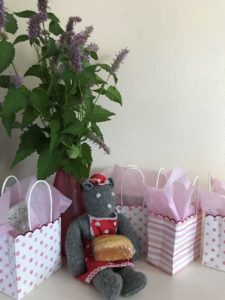 On a sunny afternoon, the children came, cheerful and with smiles, and we sat together at a beautifully prepared table, along with Miss Mouse of course.
On a sunny afternoon, the children came, cheerful and with smiles, and we sat together at a beautifully prepared table, along with Miss Mouse of course. 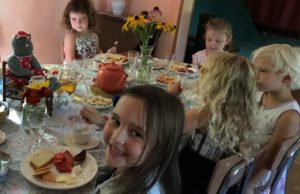 Upon reflection, our time apart and away from loved ones, gently spiraled to a day when children and I shared tea and strawberry shortcake, each with a sense of comfort and delight, while Miss Mouse sat in her little wicker chair and smiled contently. She affirmed that the world is still good, beauty is present in everyday gestures, people are still hopeful, and this home of ours, within the cosmos, is ever caring.
Upon reflection, our time apart and away from loved ones, gently spiraled to a day when children and I shared tea and strawberry shortcake, each with a sense of comfort and delight, while Miss Mouse sat in her little wicker chair and smiled contently. She affirmed that the world is still good, beauty is present in everyday gestures, people are still hopeful, and this home of ours, within the cosmos, is ever caring.
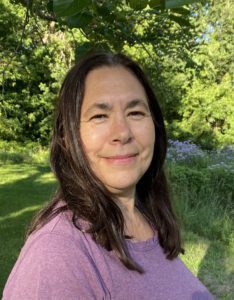
Veronica Oliva-Clour is a Waldorf-trained early childhood teacher at Little House Preschool and Kindergarten, a program for 2 ½ – 6 years old children in Central Minnesota which she owns and operates. Prior to settling in Minnesota, she lived in England where she worked for the United States Air Force in Child Development Programs for seventeen years. Veronica was born in France and calls Europe “home”. Living here in America has given her the possibility to help build bridges towards bringing genuine play and nature through the MN Parent Aware star rating accreditation program
{Editor’s note: We offer a warm thank you to Veronica who was instrumental in getting LifeWays’ book Observing Young Children accepted in Minnesota as an assessment tool for licensed child care programs!}